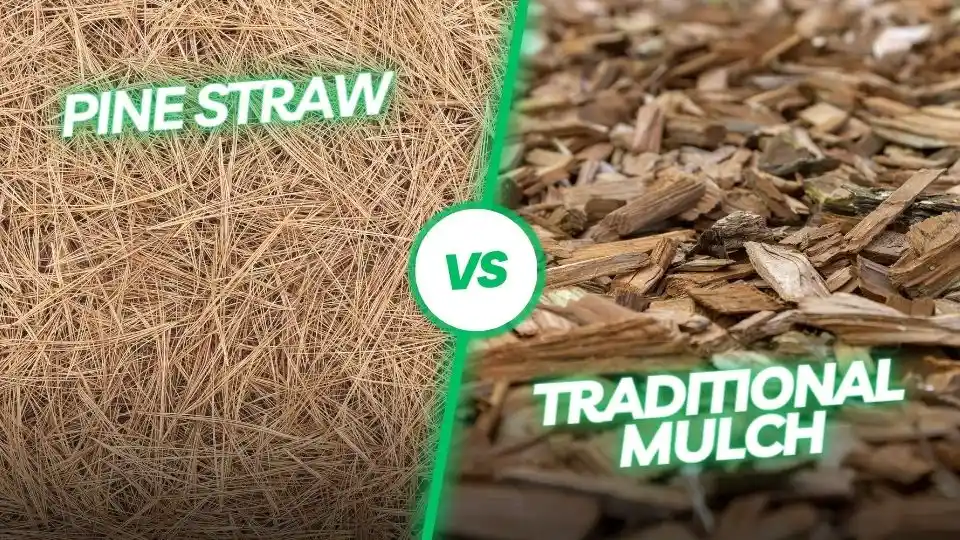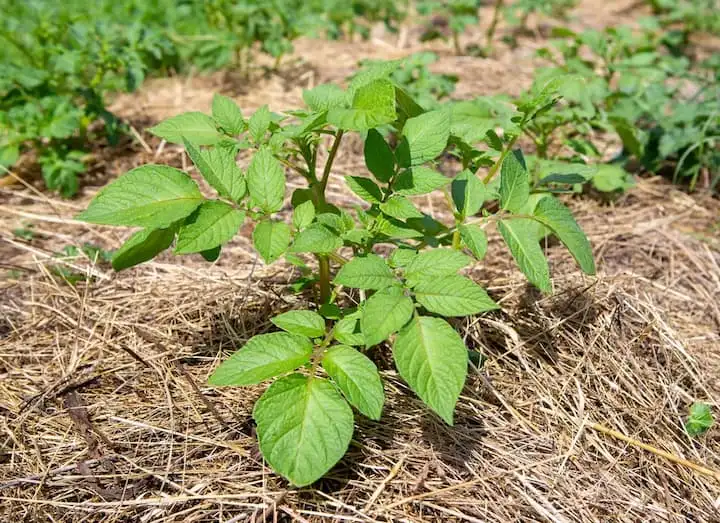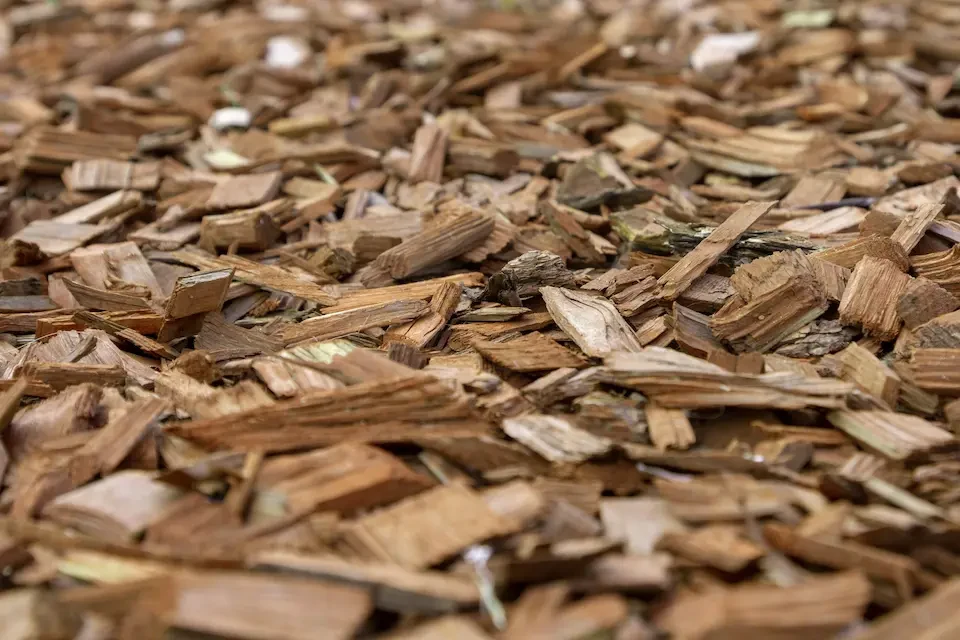Whether you’re a homeowner or business owner in North Carolina, landscaping plays a significant role in enhancing your property’s appeal and value. One of the most crucial decisions you’ll face when it comes to landscaping is choosing the right materials to accentuate your outdoor spaces.

Our Wake Forest Landscaping professionals understand the age-old debate of pine straw vs. mulch, two popular landscaping materials that can transform your property in North Carolina. FortSmith Landscaping is here to guide you through everything you need to know about these two varied options, helping you make an informed choice for your home’s landscape.
Whether you’re aiming for a natural, rustic look or a manicured, polished finish, read on to discover the key factors that will shape your landscaping decisions.
What is Pine Straw?
Pine straw, also known as pine needles or pine mulch, is a natural and organic landscaping material made from the dried needles that fall from various types of pine trees. These needles are typically collected, cleaned, and then spread across the ground as a ground cover in pine straw installation.

Natural Appearance
Pine straw has a rustic and earthy appearance, making it a popular choice for landscaping in natural or woodland settings. It blends well with the natural environment and provides a pleasing, textured surface.
Weed Suppression
One of the practical benefits of pine straw mulch is its ability to suppress weed growth. When properly applied in a thick layer, it can help prevent weeds from sprouting and competing with your desired plants and flower beds.
Erosion Control
Pine straw serves as an effective erosion control material. It helps to stabilize the soil by reducing surface runoff and minimizing soil erosion, especially on slopes and hilly terrain.
Soil Insulation and Moisture Retention
Pine straw acts as an insulating layer over the soil, helping to regulate soil temperature. It also aids as a moisture barrier, reducing the need for frequent watering and promoting healthy plant growth.
Types
The specific type of pine straw used in landscaping can vary depending on the region and the type of pine trees in the area. Longleaf and slash pine straw are two common varieties used in the southeastern United States, including areas like Wake Forest, NC.
Cost Considerations
Pine straw is generally more cost-effective than some other landscaping materials like decorative stones or certain types of mulch. Its affordability can make it an attractive option for budget-conscious homeowners.
Maintenance
While pine straw is relatively low-maintenance, it may need periodic replenishment to maintain its appearance and effectiveness. Some fluffing or raking may be necessary to keep it looking neat and even.

What is Mulch?
Mulch is a layer of material applied to the surface of the soil in landscaping and gardening to provide a range of benefits to plants and the overall garden environment. It can be made from various organic or inorganic materials and serves several important purposes.
Organic Mulch
This type of mulch is made from natural materials that decompose over time. Common organic mulch materials include shredded wood or pine bark, straw, leaves, compost, and pine needles. As organic mulch breaks down, it adds valuable organic matter to the soil, improving its fertility.
Inorganic Mulch
Inorganic mulch, on the other hand, consists of materials that do not decompose. Examples include rubber mulch, gravel, stones, and landscape fabric. Inorganic mulch provides weed suppression and moisture retention but does not contribute to soil improvement through decomposition.
Weed Control
Hardwood mulch creates a barrier that helps to suppress weed growth by blocking sunlight and preventing weed seeds from sprouting. This mulching weed control reduces the competition for nutrients and water among weeds and desired plants.
Moisture Retention
Mulch acts as a natural insulator, reducing moisture evaporation from the soil. It helps to maintain consistent soil moisture levels, reducing the need for frequent watering and protecting plants during dry periods.
Soil Temperature Regulation
Mulch provides insulation to the soil, helping to moderate temperature fluctuations. It keeps the soil cooler in hot weather and warmer in cold weather, which benefits plant roots of landscape beds.
Erosion Control
Mulch helps prevent soil erosion by reducing the impact of heavy rainfall and wind on the soil surface. This is especially valuable on sloped or exposed areas.
Aesthetic Appeal
Mulch enhances the visual appeal of landscaping by providing a clean and polished appearance. It can also define pathways and borders within a garden.
Soil Improvement
Organic mulch, as it decomposes, adds nutrients and organic matter to the soil, improving soil structure and fertility over time.
Maintenance
Regular maintenance may be required to replenish mulch that has broken down or to adjust its thickness. Mulch should be topped up as needed to maintain its desired benefits.
Factors to Consider for Pine Straw vs Mulch
When deciding between pine straw versus mulch for your landscaping needs in Wake Forest, NC, it’s essential to consider various factors to make the right choice.
Local Climate and Weather Conditions
Pine straw is well-suited for Wake Forest’s climate, which includes warm, humid summers and mild winters. It helps insulate the soil, preventing temperature extremes and moisture loss during hot, dry spells. Mulch also provides insulation and moisture retention, making it a good choice for Wake Forest’s climate. However, some organic mulches may break down faster in hot and humid conditions.
Soil Type and Composition
Pine straw doesn’t significantly alter soil composition. It decomposes slowly and adds minimal organic matter to the soil. Organic mulch, such as wood or bark mulch, gradually breaks down and enriches the soil with organic nutrients. Different mulch types may have varying effects on soil pH and composition, so choose one that aligns with your soil’s needs.
Landscape Design and Aesthetic Preferences
Pine straw provides a natural and rustic appearance, making it ideal for gardens and landscapes with a more organic and woodland feel. On the other hand, mulch comes in various colors and textures, allowing you to achieve a tailored aesthetic. It can be used to create a formal, manicured look or complement specific design themes.
Maintenance Requirements
Pine straw typically requires less maintenance than mulch. It needs occasional fluffing or raking to maintain its appearance and prevent matting. Mulch may require occasional replenishing as it breaks down over time. It may also need occasional weeding and leveling.
Budget Considerations
Pine straw is often more budget-friendly than certain types of mulch, making it an economical choice for large landscaping projects, whereas the cost of mulch can vary depending on the material and quality. Some types of mulch may be more expensive than pine straw.
Contact FortSmith Today for Landscaping Services in Wake County
In the vibrant community of Wake Forest, the choice between pine straw versus mulch for your residential landscape can significantly impact the beauty and health of your outdoor spaces. Now that you have a comprehensive understanding of the differences between pine straw and mulch, as well as the factors to consider, it’s time to turn your landscaping dreams into reality.
At FortSmith Landscaping, we’re here to transform your vision into a stunning reality. Our experienced team of landscape installation experts understands the unique demands of Wake County’s climate, soil types, and aesthetic preferences. Whether you’re looking to create a lush garden, maintain an elegant lawn, or enhance your property’s curb appeal, we have the expertise and dedication to bring your landscaping dreams to life.
Contact our lawn care and landscaping professionals today. Get started by calling us at (919) 228-8495 or filling out the contact form to the right.
